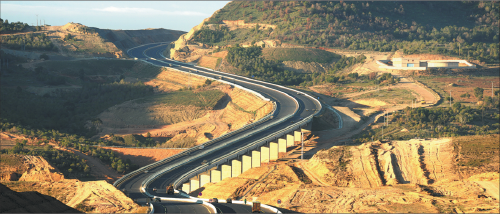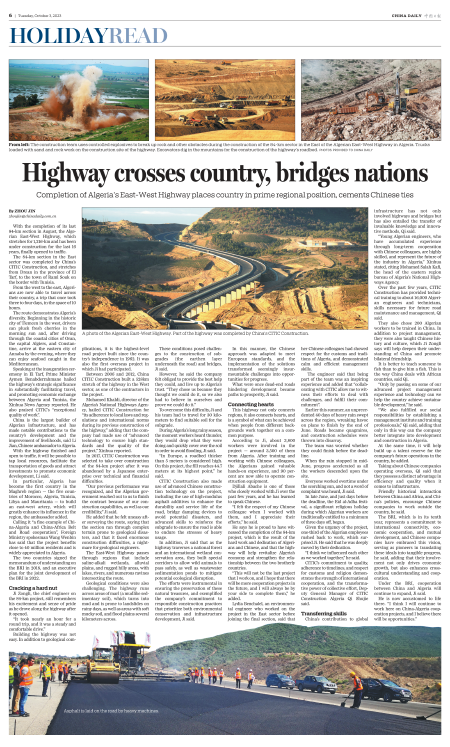
From left: The construction team uses controlled explosives to break up rock and other obstacles during the construction of the 84-km sector in the East of the Algerian East-West Highway in Algeria. Trucks loaded with sand and rock work on the construction site of the highway. Excavators dig in the mountains for the construction of the highway's roadbed.

A photo of the Algerian East-West Highway. Part of the highway was completed by China's CITIC Construction.

Asphalt is laid on the road by heavy machines.
锘� With the completion of its last 84-km section in August, the Algerian East-West Highway, which stretches for 1,216-km and has been under construction for the last 16 years, finally opened to traffic.
The 84-km section in the East sector was completed by China's CITIC Construction, and stretches from Drean in the province of El Tarf, to the town of Raml Souk on the border with Tunisia.
From the west to the east, Algerians are now able to travel across their country, a trip that once took three to four days, in the space of 10 hours.
The route demonstrates Algeria's diversity. Beginning in the historic city of Tlemcen in the west, drivers can pluck fresh cherries in the morning sun and, after driving through the coastal cities of Oran, the capital Algiers, and Constantine, arrive at the eastern city of Annaba by the evening, where they can enjoy seafood caught in the Mediterranean.
Speaking at the inauguration ceremony in El Tarf, Prime Minister Aymen Benabderrahmane hailed the highway's strategic significance in substantially facilitating travel, and promoting economic exchange between Algeria and Tunisia, the Xinhua News Agency reported. He also praised CITIC's "exceptional quality of work".
China is the largest builder of Algerian infrastructure, and has made notable contributions to the country's development and the improvement of livelihoods, said Li Jian, Chinese ambassador to Algeria.
With the highway finished and open to traffic, it will be possible to tap local resources, facilitate the transportation of goods and attract investments to promote economic development, Li said.
In particular, Algeria has become the first country in the Maghreb region 鈥� the five countries of Morocco, Algeria, Tunisia, Libya and Mauritania 鈥� to build an east-west artery, which will greatly enhance its influence in the region, the ambassador added.
Calling it "a fine example of China-Algeria and China-Africa Belt and Road cooperation", Foreign Ministry spokesman Wang Wenbin has said that the project benefits close to 40 million residents and is widely appreciated in Algeria.
The two countries signed the memorandum of understanding on the BRI in 2018, and an executive plan for the joint development of the BRI in 2022.
Cracking a hard nut
Ji Zongli, the chief engineer on the 84-km project, still remembers his excitement and sense of pride as he drove along the highway after it opened.
"It took nearly an hour for a round trip, and it was a steady and comfortable drive."
Building the highway was not easy. In addition to geological complications, it is the highest-level road project built since the country's independence in 1962. It was also the first overseas project in which Ji had participated.
Between 2006 and 2012, China CITIC Construction built a 528km stretch of the highway in the West sector, as one of the contractors in the project.
Mohamed Khaldi, director of the Algeria's National Highways Agency, hailed CITIC Construction for "its adherence to local laws and regulations and international norms during its previous construction of the highway," adding that the company had made use of "advanced technology to ensure high standards and the quality of the project," Xinhua reported.
In 2017, CITIC Construction was selected to take over construction of the 84-km project after it was abandoned by a Japanese enterprise over technical and financial difficulties.
"Our previous performance was recognized, and the Algerian government reached out to us to finish the contract because of our construction capabilities, as well as our credibility," Ji said.
He added that he felt uneasy after surveying the route, saying that the section ran through complex terrain prone to geological disasters, and that it faced enormous construction difficulties, a nightmare for geological engineers.
The East-West Highway passes through regions that include saline-alkali wetlands, alluvial plains, and rugged hilly areas, with lakes, rivers, and numerous ravines intersecting the route.
Geological conditions were also challenging. The highway runs across areas of marl (a mudlike sedimentary soil), which turns into mud and is prone to landslides on rainy days, as well as areas with soft mucky soil, and flood plains several kilometers across.
These conditions posed challenges to the construction of subgrades (the earthen layer underneath the road) and bridges, Ji said.
However, he said the company felt obliged to provide the best help they could, and live up to Algeria's trust. "They chose us because they thought we could do it, so we also had to believe in ourselves and prove we could do it."
To overcome this difficulty, Ji and his team had to travel for 30 kilometers to find suitable soil for the subgrade.
During Algeria's long rainy season, the moment workers heard thunder, they would drop what they were doing and quickly cover over the soil in order to avoid flooding, Ji said.
"In Europe, a roadbed thicker than 5 meters is considered high. On this project, the fill reaches 44.7 meters at its highest point," he said.
CITIC Construction also made use of advanced Chinese construction technology on the project, including the use of high-modulus asphalt additives to enhance the durability and service life of the road, bridge damping devices to avoid potential disasters, and advanced skills to reinforce the subgrade to ensure the road is able to endure the stresses of heavy usage.
In addition, Ji said that as the highway traverses a national forest and an international wetland conservation area, they built special corridors to allow wild animals to pass safely, as well as wastewater sedimentation ponds to mitigate potential ecological disruption.
The efforts were instrumental in ensuring the preservation of these natural treasures, and exemplified the company's commitment to responsible construction practices that prioritize both environmental conservation and infrastructure development, Ji said.
In this manner, the Chinese approach was adapted to meet European standards, and the implementation of the solutions transformed seemingly insurmountable challenges into opportunities for progress.
What were once dead-end roads hindering development became paths to prosperity, Ji said.
Connecting hearts
This highway not only connects regions, it also connects hearts, and is a symbol of what can be achieved when people from different backgrounds work together on a common purpose.
According to Ji, about 3,800 workers were involved in the project 鈥� around 3,500 of them from Algeria. After training and working with Chinese colleagues, the Algerians gained valuable hands-on experience, and 90 percent are now able to operate construction equipment.
Djillali Abache is one of those who closely worked with Ji over the past few years, and he has learned to speak Chinese.
"I felt the respect of my Chinese colleague when I worked with them, and I appreciate their efforts," he said.
He says he is proud to have witnessed the completion of the 84-km project, which is the result of the hard work and dedication of Algerians and Chinese, and that the highway will help revitalize Algeria's economy and strengthen the relationship between the two brotherly countries.
"This will not be the last project that I work on, and I hope that there will be more cooperation projects in the future, and I will always be by your side to complete them," he added.
Lydia Benchalel, an environmental engineer who worked on the project in the East sector before joining the final section, said that her Chinese colleagues had showed respect for the customs and traditions of Algeria, and demonstrated calm and efficient management skills.
The engineer said that being part of the team was an inspiring experience and added that "collaborating with CITIC allow me to witness their efforts to deal with challenges, and fulfill their commitment".
Earlier this summer, an unprecedented 40 days of heavy rain swept across the region, wreaking havoc on plans to finish by the end of June. Roads became quagmires, and construction schedules were thrown into disarray.
The team was worried whether they could finish before the deadline.
When the rain stopped in mid-June, progress accelerated as all the workers descended upon the site.
Everyone worked overtime under the scorching sun, and not a word of complaint was heard, Ji said.
In late June, and just days before the deadline, the Eid al-Adha festival, a significant religious holiday during which Algerian workers are traditionally entitled to a minimum of three days off, began.
Given the urgency of the project, one-third of the Algerian employees rushed back to work, which surprised Ji. He said that he was deeply moved by their dedication.
"I think we influenced each other as we worked together," he said.
CITIC's commitment to quality, adherence to timelines, and respect for customs and religion demonstrates the strength of international cooperation, and the transformative power of collective effort, Deputy General Manager of CITIC Construction Algeria Qi Shujie said.
Transferring skills
China's contribution to global infrastructure has not only involved highways and bridges but has also entailed the transfer of invaluable knowledge and innovative methods, Qi said.
"Young Algerian engineers, who have accumulated experience through long-term cooperation with Chinese colleagues, are highly skilled, and represent the future of the industry in Algeria," Xinhua stated, citing Mohamed Salah Kafi, the head of the eastern region bureau of Algeria's National Highways Agency.
Over the past few years, CITIC Construction has provided technical training to about 16,000 Algerian engineers and technicians, skills necessary for future road maintenance and management, Qi said.
They also chose 200 Algerian workers to be trained in China. In addition to project management, they were also taught Chinese history and culture, which Ji Zongli says will help deepen their understanding of China and promote bilateral friendship.
It is better to teach someone to fish than to give him a fish. This is the way China deals with African countries, said Qi.
"Only by passing on some of our advanced project management experience and technology can we help the country achieve sustainable development," he said.
"We also fulfilled our social responsibilities by establishing a management institute and training professionals," Qi said, adding that only in this way can the company better integrate into development and construction in Algeria.
At the same time, it will help build up a talent reserve for the company's future operations in the country, he added.
Taking about Chinese companies operating overseas, Qi said that they possess a distinct advantage in efficiency and quality when it comes to infrastructure.
Friendly historical interaction between China and Africa, and China's policies, encourage Chinese companies to work outside the country, he said.
The BRI, which is in its tenth year, represents a commitment to international connectivity, economic cooperation, and mutual development, and Chinese companies have embraced this vision, serving as pioneers in translating these ideals into tangible progress, he said, adding that their involvement not only drives economic growth, but also enhances cross-cultural understanding and cooperation.
Under the BRI, cooperation between China and Algeria will continue to expand, Ji said.
He is now accustomed to life there. "I think I will continue to work here on China-Algeria cooperation projects, and I believe there will be opportunities."
zhoujin@chinadaily.com.cn

